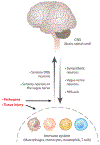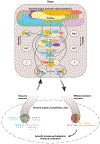Molecular and Functional Neuroscience in Immunity
- PMID: 29677475
- PMCID: PMC6057146
- DOI: 10.1146/annurev-immunol-042617-053158
Molecular and Functional Neuroscience in Immunity
Abstract
The nervous system regulates immunity and inflammation. The molecular detection of pathogen fragments, cytokines, and other immune molecules by sensory neurons generates immunoregulatory responses through efferent autonomic neuron signaling. The functional organization of this neural control is based on principles of reflex regulation. Reflexes involving the vagus nerve and other nerves have been therapeutically explored in models of inflammatory and autoimmune conditions, and recently in clinical settings. The brain integrates neuro-immune communication, and brain function is altered in diseases characterized by peripheral immune dysregulation and inflammation. Here we review the anatomical and molecular basis of the neural interface with immunity, focusing on peripheral neural control of immune functions and the role of the brain in the model of the immunological homunculus. Clinical advances stemming from this knowledge within the framework of bioelectronic medicine are also briefly outlined.
Keywords: brain; cytokines; immunity; inflammation; nervous system; vagus nerve.
Figures




References
-
- Paul WE. 1983. Preface. Annu. Rev. Immunol 1:1. - PubMed
-
- Talbot S, Foster SL, Woolf CJ. 2016. Neuroimmunity: physiology and pathology. Annu. Rev. Immunol 34:421–47 - PubMed
-
- Bonaz B, Sinniger V, Hoffmann D, Clarencon D, Mathieu N, et al. 2016. Chronic vagus nerve stimulation in Crohn’s disease: a 6-month follow-up pilot study. Neurogastroenterol. Motil 28:948–53 - PubMed
Publication types
MeSH terms
Substances
Grants and funding
LinkOut - more resources
Full Text Sources
Other Literature Sources
Medical

